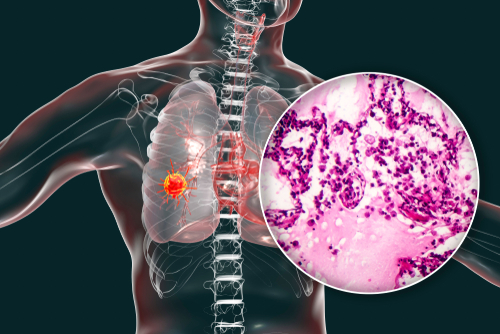
Results from a phase 1 dose-escalation study of the selective KRAS G12C inhibitor MK-1084 as monotherapy in advanced solid tumors and in combination with pembrolizumab for first-line metastatic non-small cell lung cancer (NSCLC) were presented at the European Society for Medical Oncology (ESMO) Targeted Anticancer Therapies Congress 2024.
Patients in Arm 1 (n=54) of the study received MK-1084 orally once or twice per day (25-800 mg) as monotherapy or with pembrolizumab 200 mg every 3 weeks (Arm 2; n=24) using a modified toxicity probability dose-escalation design. Patients continued treatment until disease progression, unacceptable toxicity, withdrawal, or maximum permitted cycles of pembrolizumab. The primary end points of the study were dose-limiting toxicities (DLTs), adverse events (AEs), and discontinuations due to AEs. A secondary end point was overall response rate (ORR). The median follow-up was 8.1 months for Arm 1 and 5.2 months for Arm 2.
Among the patients in Arm 1, 37 (69%) had colorectal cancer and 11 (20%) had NSCLC; 39 (72%) had two or more lines of prior therapy. Results showed no DLTs occurred in Arm 1, whereas 1 patient in Arm 2 did experience DLTs (grade 3 increased alanine aminotransferase [ALT] and grade 3 increased aspartate aminotransferase [AST]). AEs of any cause occurred in 96% of patients in Arms 1 and 2. The researchers found treatment-related AEs (TRAEs) occurred in 57% of patients in Arm 1 and 79% in Arm 2, and of these, 9% and 42%, respectively, experienced grade 3-4 TRAEs. The most common TRAEs were increased ALT (Arm 1, 15%; Arm 2, 42%), increased AST (17% and 33%), and diarrhea (13% and 17%). Results also showed ORR to be 22% in Arm 1 and 71% in Arm 2.
The researchers concluded that “MK-1084 as monotherapy and in combination with pembrolizumab showed manageable safety and preliminary antitumor activity in patients with previously treated solid malignancies and previously untreated NSCLC with KRAS G12C mutations.”
Source: Rojas CI, Lugowska I, Juergens R, et al. Updated results from a phase I study evaluating the KRAS G12C inhibitor MK-1084 in solid tumors and in combination with pembrolizumab in NSCLC. Abstract 44O. Presented at the ESMO Targeted Anticancer Therapies Congress 2024; February 26-28, 2024; Paris, France.






 © 2025 Mashup Media, LLC, a Formedics Property. All Rights Reserved.
© 2025 Mashup Media, LLC, a Formedics Property. All Rights Reserved.